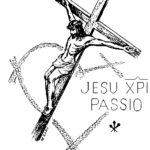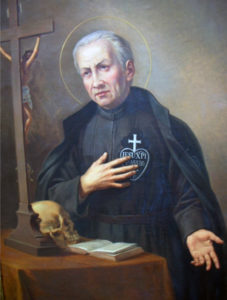Prayer is accessible to us in every moment of every day. It is our immediate connection with a God who is both transcendent and imminent. Prayer can be verbal, meditative, or contemplative. We can pray with our whole body through movement, ritual actions or by serving others.
“I used to be very formal in the way I structured my prayer time in terms of acts of faith, hope and love—all the things you learn in Novitiate. With the years, I pray much less formally, it just becomes kind of a natural rhythm, the way one approaches God. I often just sit and I’m able to gaze at the crucifix or to sit with an experience or a concern that I’ve had, or sit quietly and trustingly with God. It’s much more of an experiential piece than it used to be, of my whole person, not just my head, or thinking or organizing.” ~Fr. Michael Higgins, CP
We invite you to explore some prayers that you can use every day. We encourage you to create your own prayers for use every day.
Today’s brief prayer follows this excerpt from the letters of Passionist founder, St. Paul of the Cross:

September 2
Oh, my daughter in Jesus Christ! When, when will we be dead to everything to live only to our God? Oh, when, when? Oh, precious death, more desirable than life, death which makes us divine because it transforms us into God through love! Let us desire this death to all that is created.
Prayer:
Dear Lord, I find it so hard to sacrifice sometimes—to give up even the smallest things when you gave up everything for me. My happiness seems so tied to my earthly comforts, that I fear letting go of things. Help me to remember that when I die in small ways—when I leave behind those superficial trappings—that I grow ever closer to you.
Prayers for Every Day
Morning prayer:
Loving God, I place in your hands this day all my plans, all my work and play, suffering and joy. Guide me and all whom I love. Keep us from harm and bring us safely home to you. Amen.
Evening Prayer:
Lord God, thank you for all that has happened this day. I accept everything from Your loving hands. Keep me and all I love safe through the night, for I place my trust in You.
Prayer in Time of Need:
O Lord, in my present need, help me to believe that You are aware of my trouble and will do what is best for me. Give me the strength to trust You and put the present and future in Your merciful hands.
Grant this through Jesus Christ, our Lord, Amen.
Healing Prayer for Those Who Suffer:
Lord Jesus Crucified, I bring before You in prayer all those I know and love and all people throughout the world who are suffering in body, mind or spirit. The sufferings of Your own Agony and Passion were offered to Your Heavenly Father out of love for us. Help those who suffer today to unite themselves with You in living memory of Your Passion. Console them, Lord, ease their pain, and strengthen their hope in everlasting life with You. Amen.
Prayer of Thanksgiving:
Jesus, I thank You for the great mystery of Your Passion, Death and Resurrection. Thank you for listening to my prayers and for fulfilling the Will of Your Father each day in my life and in the lives of those I love.
Thank you for Your great gifts of the Holy Spirit, the Church and the Sacraments, especially the Holy Eucharist. Thank you for entrusting us to the care of Your Mother Mary. Amen.
Prayer to Mary:
Mother to the human family and of all nations, we confidently entrust the whole of humanity, with its hopes and fears. Do not let it lack the light of true wisdom. Guide it to seek freedom and justice for all. Direct its steps in the ways of peace. Enable all to meet Christ, the way and the truth and the life. Sustain us, O Virgin Mary, on our journey of faith and obtain for us the grace of eternal salvation.
O clement, O loving, O sweet Mother of God and our Mother, Mary!
Prayer for Peace:
Father in Heaven,
We look to you for peace in a world filled with anger.
We look to you for hope in a world filled with despair.
We look to you for love in a world filled with hatred.
O Merciful Lord,
Bless those who have been taken from us.
Grant wisdom in our future.
Bestow tranquility on our world.
Bring compassion to our hearts. Amen.



 St. Paul of the Cross invited people to share his life, devotion, and spirituality of Christ crucified in order to better understand the immense love God has for us. Fr. David Colhour, CP, offers his reflection on the life and spirituality of our holy founder.
St. Paul of the Cross invited people to share his life, devotion, and spirituality of Christ crucified in order to better understand the immense love God has for us. Fr. David Colhour, CP, offers his reflection on the life and spirituality of our holy founder.
 God, our Father, you gave me the great gift of life through the love of my mother and father. For all the good and happy memories, I thank you. For any painful or sorrowful memories, I ask forgiveness and grant it in return.
God, our Father, you gave me the great gift of life through the love of my mother and father. For all the good and happy memories, I thank you. For any painful or sorrowful memories, I ask forgiveness and grant it in return. Good Saint Anne and Saint Joachim,
Good Saint Anne and Saint Joachim, Lord, have mercy; Christ, have mercy.
Lord, have mercy; Christ, have mercy.